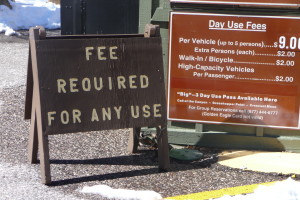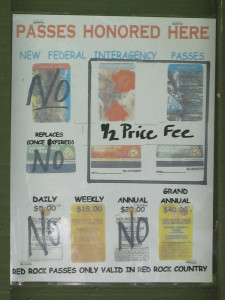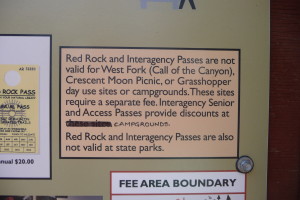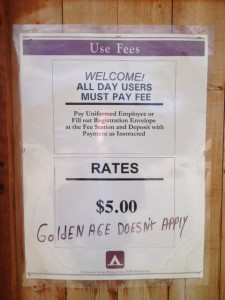BACKGROUND
 The U.S. Forest Service operates at least 80% of its most highly-developed campsites through private contractors known as concessionaires. In many forests concessionaires also operate all or most of the developed picnic areas and many trailhead parking lots. Sites that are placed under concessionaire management are essentially transferred into private ownership, although title to the land technically remains with the USFS.
The U.S. Forest Service operates at least 80% of its most highly-developed campsites through private contractors known as concessionaires. In many forests concessionaires also operate all or most of the developed picnic areas and many trailhead parking lots. Sites that are placed under concessionaire management are essentially transferred into private ownership, although title to the land technically remains with the USFS.
The decision to issue a concessionaire permit is not subject to any public notice or comment. Once a permit is issued, all fees paid at that facility are the private revenue of the concessionaire. Concessionaires are allowed to charge fees, such as solely for parking, that the USFS is prohibited from charging. They are not required to honor federal recreation passes on the same terms as the agency must. For example, if you use a USFS-operated picnic area that charges a fee your America The Beautiful Pass covers that fee. But if the same site is privately managed by a concessionaire, they don’t have to honor your pass and in most cases they don’t. Concessionaires are allowed, and in some cases required, to establish and sell their own private passes for access to sites under their management even though those sites are public property and the facilities were built at taxpayer expense.
As a condition of their permits, concessionaires pay a portion of their gross revenue to the USFS. The amount is established by competitive bid and typically runs 10-15%. It is very rarely paid in cash. It is paid instead as “offsets” which is work performed by the concessionaire above and beyond daily operations, such as painting picnic tables or filling potholes. This work is assigned a dollar value and that is offset against the fee owed, typically covering 100% of it. This has a ratchet effect by allowing the concessionaire to increase prices by pointing to the newly-painted tables and the improved roads. The entire process is administrative with no public participation at any stage.
 Because concessionaires are private companies, they operate for profit, and because they only bid on the most highly-developed and therefore lucrative sites, their prices tend to be substantially higher than at agency-managed facilities. Coupled with the fact that concessionaires are allowed to charge for things like parking and scenic overlooks which FLREA prohibits the USFS from doing, the issuance of a concession permit for all intents and purposes takes the facilities included in the permit out of public hands and privatizes them.
Because concessionaires are private companies, they operate for profit, and because they only bid on the most highly-developed and therefore lucrative sites, their prices tend to be substantially higher than at agency-managed facilities. Coupled with the fact that concessionaires are allowed to charge for things like parking and scenic overlooks which FLREA prohibits the USFS from doing, the issuance of a concession permit for all intents and purposes takes the facilities included in the permit out of public hands and privatizes them.
This use of concessionaires to evade the federal law that governs recreation fees was challenged in a lawsuit filed on September 11, 2012 in Washington DC District Court. [See details below] In the suit, four individuals from Oregon, Arizona, and Colorado joined with an Oregon watchdog organization to charge that the Forest Service is establishing new fee sites by including them in concessionaire contracts without the public participation required by law. Also at issue was the use of concessionaires to charge fees that the law prohibits. These prohibitions include fees for parking, general access, use of dispersed undeveloped areas, and scenic overlooks.
 On March 28, 2014 the court issued its ruling, in favor of the Forest Service. The judge said that a phrase in FLREA that allows third parties to charge for goods or services “notwithstanding any other provision of law” conveys a get-out-of-jail-free card on concessionaires. They can charge fees that the Forest Service is prohibited from charging and don’t have to go through any public process to establish or raise fees.
On March 28, 2014 the court issued its ruling, in favor of the Forest Service. The judge said that a phrase in FLREA that allows third parties to charge for goods or services “notwithstanding any other provision of law” conveys a get-out-of-jail-free card on concessionaires. They can charge fees that the Forest Service is prohibited from charging and don’t have to go through any public process to establish or raise fees.
Although disappointing, this ruling at least brings certainty to the situation: The only way that the concessionaires are going to be held to any restrictions is if Congress changes the law. They must either step up to protect our access to our public lands, or allow them to be privatized and commercialized without limits. No ducking the issue – it’s up to them.
So that means it’s up to us. We must flood Congress with demands that the Forest Service be prevented from turning over all recreation to private interests. They are actively pursuing replacement legislation to FLREA – it must include meaningful protections for the public against concessionaire fees and policies that treat access to the natural world as a market commodity, charging whatever the market will bear for any experience on which a price can be placed.
WHAT YOU CAN DO Go to senate.gov and house.gov, click on the contact forms for your US Senators and your US Representative, and tell them that you want National Forest recreation to be managed consistently nationwide, regardless whether the Forest Service has outsourced a site to private interests or not. The complete privatization of public lands is at stake!
In late 2010, the concessionaire lobby and the Forest Service proposed that federally-issued Senior and Disabled (Golden) passes should no longer entitle their holders to a discount on camping fees. The proposal met a firestorm and was quickly withdrawn. Read more HERE.
Concessionaire-operated campgrounds are more expensive than agency-operated ones, and they do not get taxpayers off the hook financially. Read a detailed analysis by High Country News below:
2014_07_18_HighCountryNews_The privatization of public campground management 2014_07_18_HighCountryNews_Concessionaire_Explainer
A concessionaire’s letter begging the Forest Service to raise prices at agency-managed campgrounds because otherwise the price disparity between those and concessionaire-operated ones makes him look “greedy.”
Willamette_Hoodoo_Letter
Concessionaire Lawsuit Legal Filings
The key filings with the Washington DC District Court.
01 Concessionaire Policy Lawsuit
02 FS Formal Answer to Lawsuit – Briefs to follow
03 Concessionaire Motion to Intervene
04 Concessionaire Intervention Granted
05 Plaintiffs Motion For Summary Judgement
06 Response of Concessionaire Intervenors
07 Response of US Forest Service
08 Plaintiffs Reply
09 Forest Service Reply
09 Intervenors Reply
10 Court Ruling
Concessionaire Policy Lawsuit Media
Media stories about the lawsuit challenging the Forest Service concessionaire policies
2012 09 13 Summit County Voice
2012 09 14 Courthouse News
2012 09 16 Payson Roundup
2012 09 14 Bend Bulletin
2012 09 28 Denver Post
2012 09 28 Canon City Daily Record
2012 10 03 Boulder Daily Camera LTE
2014 05 06 Denver Post Forest Fees OK If Concessionaire Charges Them
In 2015 the Tahoe National Forest bucked the system and “took back” a number of campgrounds into agency management instead of renewing the concessionaire’s permit. The concessionaires were madder than a wet hen about that, but the public loved it. They plan to convert even more campgrounds from concessionaire to agency management in 2016. Go Tahoe!
2016_02_24_Tahoe_Getting_Great_Response_To_Eliminating_Concessionaire
